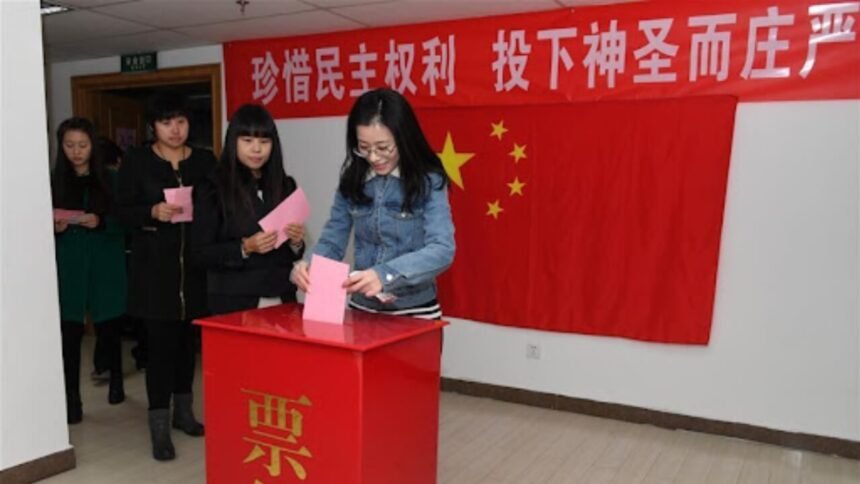United States and most of the western countries could be mentioned when we consider democracy and election. And, what about China, one of the global super powers and its economy which happens to be one of the largest in the world? Is there an election in China, or does the political road of the Country go another way? The answer to this question is not that easy as people think because the political system in China does not work in the same manner as most Western democracies. In this blog post, we are going to talk about all of the complexities of the Chinese political system, first of all, we are not going to focus on elections but on their functioning as they are not what we might expect.
To comprehend the politics of China, there is need to take a closer look into the politics of China including the single party system, elections, and the role of the Communist Party of China (CPC) in decision making. We are also going to mention areas of distinction in the way China and the Western countries conduct their electoral process and how this will affect the way the nation is governed.
Political System of China:
Structure The political system of China is uniform, and its structure is shown in Fig 1 The Structure of the Chinese Political System Fig 1 The Structure of the Chinese Political System
The Role of the communist party of China (CPC)
The very foundation of the political system in China is the Communist Party of China (CPC) that has been exercising the political control over the country since 1949. The CPC is not only a political party but also the core organization that influences the future development of the state, policies, decisions made by the leaders of the country and the national development objectives. The concept related to elections in China is one of the main areas of misunderstanding since this country is ruled by a one-party system. The system in China is unlike that of the democratic countries where, various political parties compete with each other to seize power but the CPC system is in control of every layer of government.
Political power is concentrated in the center in the hands of few top leaders in the epoch of CPC. In China, the leader is the President who is also the General Secretary of the Communist Party. The difficulty of defining the power which is vested in certain hands, is one of the reasons why the word election is a false term to apply to the political structure of China.
Local Level Elections
The elections are held in China, yet they are essentially not similar to the elections in democratic countries. The local elections in China do occur at the levels of village, town and district, and people are free to choose the local representatives. These elections are not extensive as the candidates have no option other than winning the approval of the Communist Party. The use of these elections can be considered as keeping the stability and assuring that local governance will be located on the same course as the national party.
Although local elections are going to provide individuals with a certain level of participation, it is necessary to mention that the candidates tend to be related to the party and follow its regulations. Choice of the voter is thus limited. Dr. Minxin Pei, a professor of government at Claremont McKenna college explains that the political system of China is established in such a way that communist party remains in a stable position. The local elections are in the character of the symbols and they are used to legitimize the rule of the Party” .
The National People Congress: National Elections
The National People congress (NPC) which is the national legislature of China is said to be an example of the election process in China. Nevertheless, the process of electing the NPC has nothing in common with the elections taking place in the United States or Europe. Members NPC are chosen by indirect elections which are held every five year; the local councils provide delegates to the members of the national assembly.
But technically, the NPC is a representative body but the Communist Party dictates the process and ensures that those candidates who are vying get into office are in tandem with their policies. The NPC is not a real check on the government but it is a rubber stamp institution and approves what is decided by the leadership of the Party. The Politburo is a body of the Communistic Party officials of China who do hold the real power.
The Leadership and the Selection of Chinese President
President is the chief of state and one of the topmost leadership functions in China. The President is however a ceremonial position and in reverse this ultimate authority is held by the General Secretary of the Communist Party who is the overall decision-making organ in the domestic and international affairs of China. Popular elections of the President or other high officials are not conducted but rather are pursued through internal Party procedures.
The National Party Congress is the most outstanding party process of the Communist Party with the congress being more often once in every five years. It is at this congress that the General Secretary, the President and other senior officials are selected after nominations are carried out by the delegates who are handpicked by the Party. These selections are technically elections in the Party and yet the decisions are not made by the public.
Does the Chinese have Freedom of Choice at Chinese Elections?
Issue of absence of actual political contention is one of the key elements that stand out to distinguish between Chinese elections and those of the democratic nations. In a democratic election, there are various parties which compete in search of power and voters are given the option of several platforms and ideologies. Such a competition is absent in China. The only active political force is the Communist Party and any political opponent is either crushed or downraised.
There is absence of political plurality hence the Chinese voters are not at liberty of voting between parties. Instead, they are electing those that have been vetted by the Party. This really curtails the choices that voters can make and casts doubt over the validity of the voting procedure.
Myth of free elections in China
According to the holding of elections in China, it is imperative to know that China has nothing to do with elections in the way they are conducted in democratic countries. The electoral system that has been created in China is to support the power of the Communist Party and ensure that the power will never be challenged. All of the local elections, the public is given the right to vote to participate in, are, nonetheless, also managed by the Party, where candidates have a habit to be initially approved.
Moreover, the press in China is extremely Government-regulated and critical thoughts are banned. This implies that voters do not get all the information to make their decisions and this calls into question the ethics and openness of the whole election process. Conversely, democratic elections in the west provide a free choice of ideas whereby the campaigns are open and debate is conducted freely to provide the electorate a wider scope of information to choose wisely.
How China Achieves stability, and legitimacy.
The political structure of China lies on the thought about the preservation of stability and the guarantee that the Communist Party will remain in the power. On one hand, there are people who speak ill of this system due to unavailability of democratic freedoms in it, and on the other there is the Party demonstrating that its governance system has contributed to the economic growth and social stability like never before. Gathering of power using only a few elite leaders enables China government to use the power effectively where policies are established fast and efficiently reducing the delays which often have to characterize the more divided democratic systems.
In the said respect, the Chinese attitude towards elections can be regarded as the means of strengthening the legitimacy of the Party. The government can make it appear that people are participating in the country but in fact the power is with the Communist Party all along; this is by creating the illusion through the local elections. This model, though not akin to Western style democracy, has achieved success at ensuring that the Party holds the bargaining power to power over the decades.
Conclusion: What Does this Political System in China Portend in Future?
China has its own stand on elections and this is part of its political culture and governance system. Although there are elections in the country, they are not really competitive as we are accustomed to in the Western democracies. The Communist Party of China is at the heart of the political system of this country, and its hold on the power is not going to loosen in the future.
Those that are held are mostly just ritualistic, giving citizens a channel of expressing themselves on a local scale with the justified security that all significant choices rest with the Party. Such a system has enabled China to make a stunning success with regard to its economy, yet the same system begs serious questions regarding the future of political freedom and governance within the nation.
The political system of China will become the subject of discussion as this country gradually extends its impact in the world. Many will say that they would like these changes to be more democratic, but some will say that stability and prosperity of the country proves that their model is effective. The argument as to which way to go concerning China and its electoral process is not yet exhausted and we are yet to see where this will lead to as far as the future of global politics is concerned.
Ultimately, the Chinese political regime demonstrates that elections are a big deal of a bigger scene of a government. The leadership in the country has demonstrated that stability and control can be achieved even without the common electoral process as evidenced in the western democracies. In the meantime, China will keep developing its own way and its political destiny will keep being of interest and focus of the whole world.






